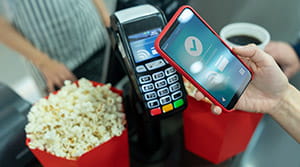Protect your finances—What to know when using P2P apps

In the digital age, peer-to-peer (P2P) payment apps have become increasingly popular for their convenience and ease of use. Platforms like Zelle®, Venmo or Cash App enable users to transfer funds instantly for splitting bills or even paying friends. While becoming more common, it's important to be aware of the risks and scams associated with P2P usage. Here are ways to protect yourself when using P2P payment services, so you can avoid common scams and fraud.
More about P2P payments
There are many popular P2P platforms like Venmo, Apple Cash, PayPal and Zelle®,which is available to Banner Bank clients. Platforms may differ slightly, but they all enable users to transfer money to each other. When you link your individual bank accounts, or credit and debit cards through a P2P website or mobile app, any type of transaction can be made. Read more about P2P and the benefits of money transfers.
Understand the risks
Unlike traditional banking transactions, P2P apps often lack the same level of consumer protection. Once a payment is made, it can be challenging to recover funds. Consider these safety tips:
- Use trusted and secure platforms—Well-known and reputable P2P platforms like Zelle® have established security policies in place to safeguard your transactions so avoid using lesser-known apps.
- Enable multi-factor authentication—This added verification step usually requires a code sent to your phone or email, and reduces the risk of unauthorized access to your account.
- Set strong passwords—Weak passwords can make your account vulnerable to hacking. View these tips to create strong passwords and increase your security.
- Avoid suspicious requests—Verify the identity and legitimacy of the person before sending money. Confirm the person’s username, phone number or email address.
- Keep apps updated—Regularly update your P2P apps to ensure you have the latest security patches and bug fixes.
- Monitor account activity—Review your transaction history and watch for any suspicious transactions. If you notice issues, report them immediately to your P2P payment provider.
Be cautious of P2P scams
No payment app is immune to fraudulent activity. Here are common scams to avoid:
- Fake buyer/seller scams—Bad actors pose as buyers or sellers and use the apps for transactions. They may offer to purchase items, but send a fake payment notification or fraudulent funds. They may also request money for a product or service and disappear after you pay them.
- Phishing scams—Scammers send fraudulent emails or text messages posing as the app administrator or a financial institution, asking for personal information, account details or login credentials. These messages often contain links that lead to fake websites designed to steal your information. Learn how to spot a phishing scam.
- Overpayment scams—Fraudsters send a payment through the P2P app that exceeds the agreed-upon price. They ask you to refund the excess amount, but the original payment they sent is later reversed or found to be fraudulent, leaving you at a loss.
- Rental scams—People list fake rental properties online and request that potential tenants pay a deposit or rent through the P2P app. Once the payment is made, they disappear with the money, leaving the victim without a rental property.
- Puppy scams—Scammers post ads on social media claiming to have a litter of puppies for sale, and collect payment through P2P apps for a dog that doesn’t exist. Do your research and confirm the validity of the sale. You can ask for references, documentation and try to meet with the seller in a safe place to finalize the payment.
- Bad actor phone scams—Scammers will call pretending to be a reputable company or agency such as the US Post Office. They’ll ask for your six-digit security code to get into your P2P payment app, when really they’re trying to hack your information.
When weighing your payment options, it’s important to prioritize the security of your finances. To learn more about P2P services or Zelle®, you can always reach out to your local banker for assistance.
























